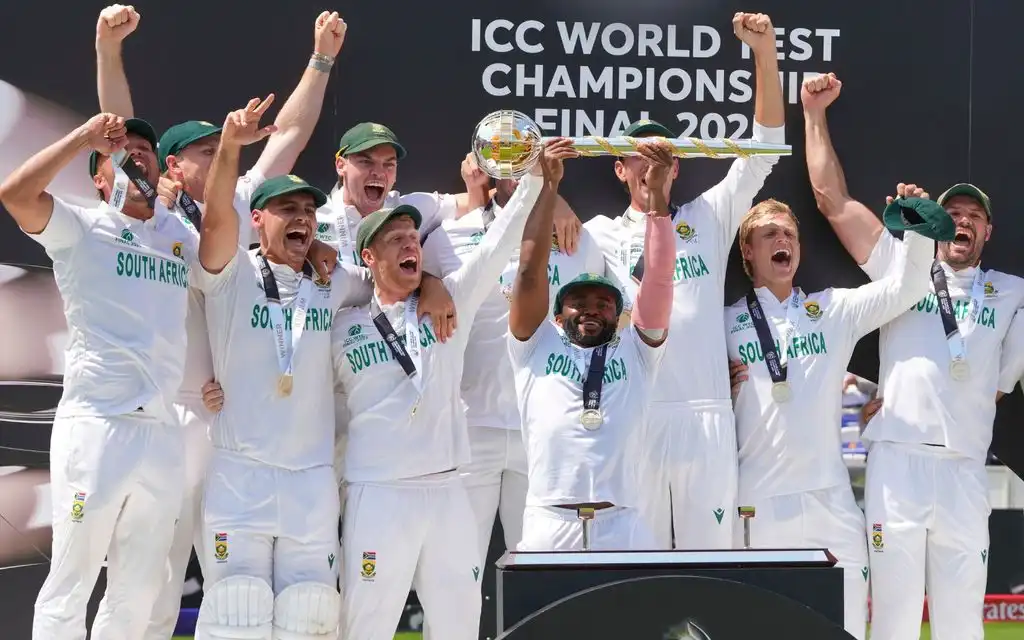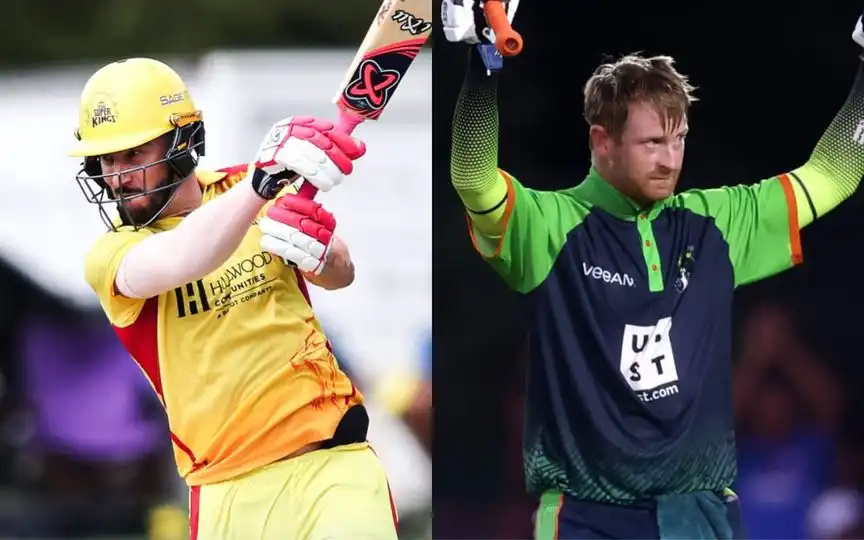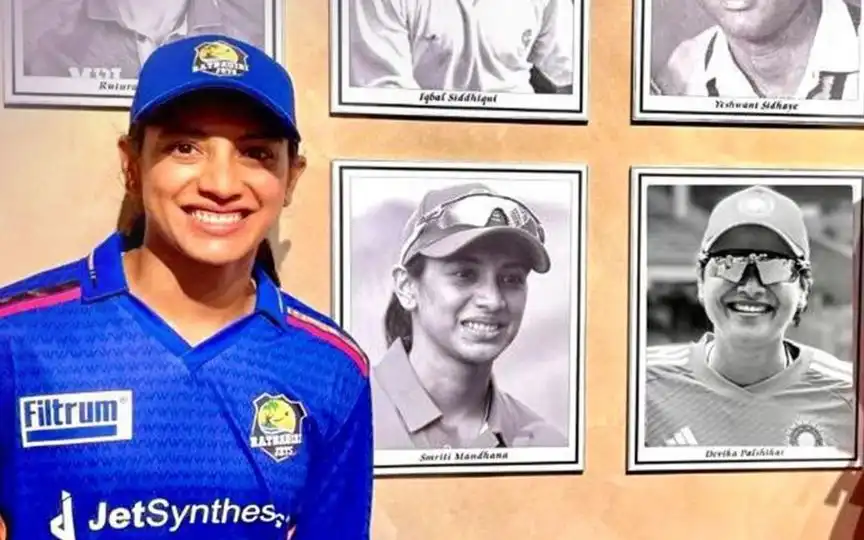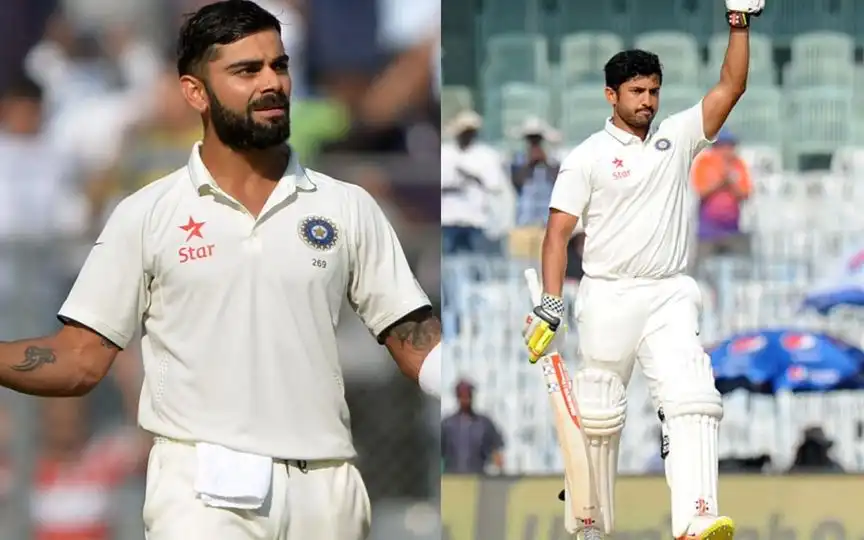 South African team with WTC mace (Source: AP Photos)
South African team with WTC mace (Source: AP Photos)
"Who could doubt that sport is a crucial window for the propagation of fair play and justice? After all, fair play is a value that is essential to sport." - Nelson Mandela
This is how the first President of South Africa and Nobel Peace Prize winner, summed up the importance of sports in society. He considered sports as a tool for eradicating injustice and promoting equality in our day-to-day life.
Now, many will argue that the world is taking active steps in proving Nelson Mandela right, while others might consider it a utopian thought with less connection to the practical world. At face value, it is hard to discount both arguments. So, let's dive deeper into Mandela's vision through the lens of Test cricket, a format of cricket that is a product of the pre-industrialisation world, in contrast to many other sports that came into existence after the capitalist system started gaining ground.
WTC - A Tool To Protect Test Cricket?
Though the roots of cricket go back to the 17th century, the first official Test match was played in 1877 between England and Australia. Over the years, different teams have found their feet in the sport and limited-overs cricket is now a big stakeholder due to the changing nature of the world.
However, despite all the changes, Test cricket has survived and every now and then, the cricketing community finds its urge to protect and develop the purest form of the game. Amidst all the scepticism around the format, the ICC's decision to introduce a World Test Championship starting in 2019 was a significant move in the right direction. The intention here was to provide more context to Test cricket, and thus, bring more audience to the format.
However, since the World Test Championship started, it has constantly faced criticism. On the cricketing front, the major issue is the uneven distribution of the matches among countries featuring in the Championship. The Big Three - England, India and Australia are playing five-match Test series among themselves, while teams like New Zealand, South Africa and Pakistan who are also highly reputed cricket countries often end up playing two matches in a Test series.
A Loud Cry For Cricketing Logic Or Blame Game?
This has created a situation where teams from both sides are complaining, resulting in constant debates and a blame game. Many former cricketers from countries like England, Australia and India have accused teams like South Africa and New Zealand of using the easier route of a two-match series to their advantage and qualifying for the WTC final. On the other hand, the stakeholders from the lesser-fancied countries have expressed their frustration of not being given a fair chance to play Test cricket.
"Our Test team is playing two-Test series, which is ridiculous in my eyes. It's disappointing, and it doesn't sit well with the players because we want to play more cricket against these guys, and against the other countries as well, but we always find a way to just play two games or three games, and it's annoying," Heinrich Klaasen as quoted by Cricket.com.
Things were expected to change when New Zealand beat India in the 2021 WTC final. However, the Kiwis got no extra attention after the win, and they continued to play two-match Test series. Now, South Africa, another team in the two-match Test series bracket have defeated the member of the 'Big Three' to spur on the debate of more equitable distribution.
In WTC history, England, India and Australia have collectively played 175 Test matches. In contrast, South Africa, New Zealand and Pakistan have a combined total of 140 Tests. This gap is expected to widen further in the next WTC cycle, as 19 of the 27 series will have only two matches, while the Big Three will continue to play five-match Test series against each other.
Number Of Test Matches Played In WTC History
| Team | Total Test Matches |
| England | 65 |
| India | 56 |
| Australia | 54 |
| South Africa | 41 |
| Pakistan | 40 |
| New Zealand | 39 |
| West Indies | 39 |
| Sri Lanka | 37 |
| Bangladesh | 31 |
Money - A Dominating Factor In The Narrative Of Test Cricket Protection
So, is Test cricket moving in the right direction? Surely, the argument for the protection of merit seems quite weak, as WTC winners are not getting their due attention.
The whole exercise of the WTC cycle at this point in time is dominated by revenue and the popularity of the teams. According to the revamped distribution model of the ICC, 38.5 percent of the apex board's approximate annual earnings would go to the BCCI.
India is the biggest market for cricket in the world while England and Australia follow them. Therefore, the distribution of Test matches clearly aligns with this revenue generation of each board, and the cricketing logic finds attention only in decorated interviews and debates.
Fair Play, What Is That, Mr. Mandela?
Thus, the whole perception of ICC trying to save Test cricket with a novel tool of WTC seems to be a hoax and a result of a false narrative, a rampant feature of the Post-Truth World we live in.
But it is just the capitalist model we are all part of, isn't it? So, is it wrong that the stakeholders are adjusting to the world order? Not exactly. However, it is important to realise that the whole talk of protecting tradition and the pure form of cricket is largely a marketing tool and is the game's way of adjusting to the changing times.
The fair distribution of matches seems nowhere in the picture currently, unless market forces support such an act. There would be tokens of good gestures in between - one-off Tests with associate nations, and four-day Tests for lesser teams - but the hierarchy will remain. Thus, expecting a fair play for all stakeholders as envisioned by Nelson Mandela sadly looks like a distant dream.
.jpg)
.jpg)

 (1).jpg?type=mq)


